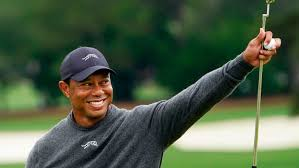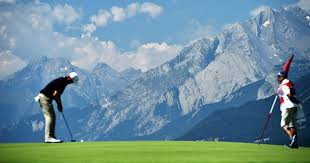From Pastures to PGA: A Storied History of Golf
- Debbie Brown

- Mar 24
- 5 min read
Golf is a game of precision, patience, and perseverance. It has been enjoyed for centuries, attracting both the most dedicated athletes and casual weekend players. From its ancient origins to its influence on pop culture and literature, golf has shaped the way people engage with sport and leisure.

Origins of Golf
The origins of golf can be traced back to Scotland in the 15th century. While similar games existed in various parts of Europe, the Scots developed a version of the game in which players used clubs to hit a ball into a series of holes in as few strokes as possible. The game gained popularity, and in 1744, the Honourable Company of Edinburgh Golfers drafted the first official rules. By 1764, the standard 18-hole course was established at St. Andrews, which remains one of the most revered golf courses in the world.


Over the years, golf has expanded beyond national competitions, with international events gaining prominence. The Ryder Cup, established in 1927, is a biennial team competition between the United States and Europe, known for its intense rivalries and dramatic finishes. Other major international tournaments include the Presidents Cup, which pits the U.S. against a team of international players outside Europe, and the Solheim Cup, the women's equivalent of the Ryder Cup. Additionally, golf was reinstated as an Olympic sport in 2016 after a 112-year absence, further solidifying its global appeal and attracting a new generation of players.
The origin of the word golf is somewhat debated, but it is generally believed to have derived from the Middle Dutch word kolf or colf, meaning "club" (Smail, 1980). During the late Middle Ages, the term was adopted into the Scots language as gouff or golf, referring to a game played with a stick and ball. Over time, the pronunciation and spelling evolved into the modern English golf after vascillating between different versions of the word for hundreds of years. The permanent version of the modern golf appeared in Walter Scott's 1816 text, The Antiquity, and has remained the accepted name of this game. Contrary to some myths, the term is not an acronym (a commonly believed acronym is Gentlemen Only, Ladies Forbidden) but rather a linguistic adaptation from earlier European sources.
Golf's Beginnings in the United States
Golf arrived in the United States in the late 19th century. One of the earliest golf clubs was the Oakhurst Golf Club in White Sulphur Springs, West Virginia, founded in 1884 by Russell Montague and several local enthusiasts. The course, designed with a rudimentary layout, became a cornerstone for the early development of American golf. Additionally, another of the first formal golf clubs, the Saint Andrew’s Golf Club, was established in Yonkers, New York, in 1888 by a group of Scottish expatriates. Soon after, courses began appearing across the country, and the United States Golf Association (USGA) was formed in 1894 to govern the sport.

By the early 20th century, golf was booming in popularity, leading to the establishment of major tournaments such as the U.S. Open, the Masters, the Open Championship, and the PGA Championship, collectively known as the four Majors. Other popular tournaments played today include The Players Championship, the Ryder Cup, the FedEx Cup Playoffs, and the Presidents Cup.
American Golf Legends: Arnold Palmer, Jack Nicklaus, and Tiger Woods
Arnold Palmer – Known as "The King," Palmer helped transform golf into a mainstream sport in the 1950s and 1960s. His charismatic personality and aggressive playing style won him seven major championships and millions of fans.

Jack Nicklaus – With 18 major championships to his name, Nicklaus is considered one of the greatest golfers of all time. His skill and sportsmanship set a high standard for future generations.

Tiger Woods – Arguably the most famous golfer in history, Woods revolutionized the game with his unmatched talent and mental toughness. With 15 major championships and a global following, he has inspired countless players worldwide.

Golf's Influence on Popular Culture
Golf has left an indelible mark on popular culture, inspiring movies, literature, and even fashion. Some of the sport’s greatest players have become household names, and its presence in entertainment continues to draw new fans to the game.
Golf in Film
Several movies have captured the essence of golf, blending the sport’s challenges with humor and drama:
The Legend of Bagger Vance (2000) – Starring Will Smith, Matt Damon, and Charlize Theron, this film explores themes of redemption and personal growth through the game of golf.

Caddyshack (1980) – A cult classic, this comedy starring Chevy Chase, Rodney Dangerfield, and Bill Murray hilariously portrays the antics at an exclusive country club.

Happy Gilmore (1996) – Adam Sandler plays an unconventional golfer with a hockey background, bringing a unique and comedic twist to the sport.

Golf in Literature
Golf has also been the subject of several novels that capture its nuances and appeal:
"Golf in the Kingdom" by Michael Murphy – A philosophical exploration of golf and self-discovery, blending mysticism with the sport’s deeper meaning.

"The Greatest Game Ever Played" by Mark Frost – The inspiring true story of Francis Ouimet’s victory in the 1913 U.S. Open, showcasing the triumph of an underdog.

"Dead Solid Perfect" by Dan Jenkins – A humorous and insightful novel about the world of professional golf.
The Invention of Miniature Golf
Miniature golf was invented in the early 20th century as a more accessible and entertaining version of the traditional game. The first known course, "Thistle Dhu," was built in Pinehurst, North Carolina, in 1916. By the 1920s and 1930s, miniature golf courses spread across the United States, often featuring whimsical obstacles and creative themes. Today, mini-golf remains a beloved pastime worldwide, appealing to families and casual players alike.
Final Thoughts
Golf is more than just a game—it is a cultural phenomenon that has influenced sports, entertainment, and literature for generations. From its origins in Scotland to its modern-day global reach, golf continues to challenge and inspire players of all skill levels. Whether played on a championship course or a local mini-golf course, the sport remains a timeless pursuit that brings people together in the spirit of competition and camaraderie.

Check out the golf resources at Buhl Library! And students, don't forget to sign up for our Mini Golf in the library event, taking place Friday, March 28. Reservations are not required but are strongly recommended!
References
Frost, M. (2002). The Greatest Game Ever Played: Harry Vardon, Francis Ouimet, and the Birth of Modern Golf. Hyperion.
Henderson, J. (2005). Golf: History & etymology. Oxford University Press.
Jenkins, D. (1988). Dead Solid Perfect. Simon & Schuster.
Murphy, M. (1972). Golf in the Kingdom. Viking Press.
Oxford University Press. (n.d.). Golf, n. In Oxford English dictionary. Retrieved March 24, 2025, from https://doi.org/10.1093/OED/1145433323
St. Andrews Links. (n.d.). History of Golf. Retrieved from https://www.standrews.com
United States Golf Association (USGA). (n.d.). A Brief History of Golf in America. Retrieved from https://www.usga.org



Comments